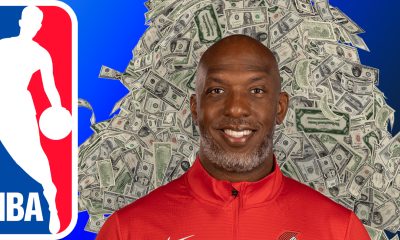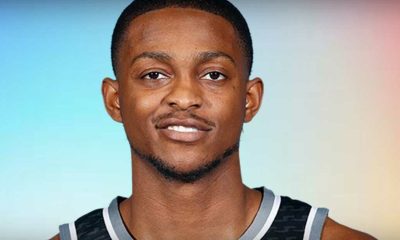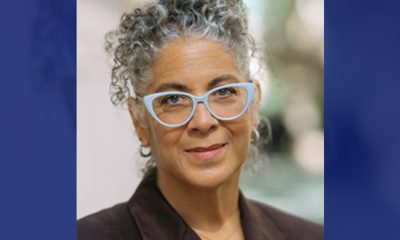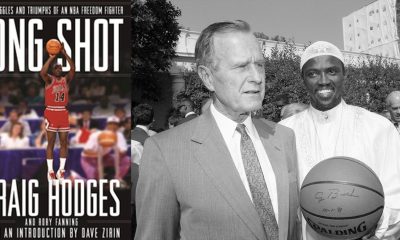Sports
Duke’s Mike Krzyzewski Adapts to ‘1-and-Done’ World

Duke’s Jahlil Okafor (15) passes to Tyus Jones (5) as North Carolina’s Brice Johnson, left, and Jackson Simmons defend during the first half of an NCAA college basketball game, Saturday, March 7, 2015, in Chapel Hill, N.C. (AP Photo/Gerry Broome)
AARON BEARD, AP Basketball Writer
DURHAM, N.C. (AP) — There was a time when Duke’s Mike Krzyzewski led Final Four teams built around players who stayed for years to grow into tournament-tested veterans.
No longer, not in today’s one-and-done world in which top players rarely stick around long.
The Blue Devils enter this week’s Final Four relying on more freshman starters than John Calipari at Kentucky’s NBA factory. They have three freshmen players facing stay-or-go NBA decisions after the season.
“What Coach K has done in my judgment, and I think Calipari has done the same thing, they’ve adapted to the landscape, and they are dealing with it in a positive way,” said Jay Bilas, an ESPN analyst who played on Krzyzewski’s first Final Four team in 1986.
“Now people want to use value judgments to it and say, ‘This is not the way it’s supposed to be’ and ‘This is antithetical to college.’ Well, says who?”
Krzyzewski, the Hall of Famer in his 35th season at Duke and the winningest coach in men’s Division I history with 1,016 wins, didn’t have a player go pro early for nearly two decades until three left in 1999. Elton Brand was the first that year after his sophomore season, followed by fellow sophomore William Avery and then freshman Corey Maggette a few weeks later as Krzyzewski’s first of five one-and-done players.
It took five years for Luol Deng to become the next freshman to leave, but Duke has now had three in four seasons: No. 1 overall pick Kyrie Irving in 2011, Austin Rivers in 2012 and Jabari Parker last year.
It’s forced the 68-year-old Krzyzewski to adjust his approach compared to the days when Christian Laettner, Bobby Hurley and Grant Hill were four-year guys or even when Jay Williams, Carlos Boozer and Mike Dunleavy stayed for three.
“It actually starts before they get here,” Krzyzewski said. “We try with the kids, especially if they commit early, to develop even a deeper relationship with them than we did 10 years ago. You had time (then). You want to know them even better because you’re only going to have them for a shorter period of time.”
Duke (33-4) is built around star freshman big man Jahlil Okafor, a possible No. 1 overall pick who chose Duke jointly with point guard Tyus Jones. Forward Justise Winslow is the other every-game freshman starter.
Their arrival comes a year after Parker arrived as an all-but-certain one-year player.
The reality is it isn’t all that different — except maybe for the smaller numbers — than what Kentucky’s Calipari often is criticized for doing with his “succeed and proceed” approach, a response to the NBA’s requirement for players to be at least one year out of high school before entering the draft.
As Bilas sums it up, Krzyzewski “has been playing against these players, and if some of them want to come to Duke, why not take them?”
And considering college should help prepare someone for a job, there’s nothing wrong with a player leaving school to start a lucrative career.
“I really get tired of this discussion of basically people — and they’re not just fans, they’re NCAA member administrators — their view is ‘Our one-and-done is a great kid that had a wonderful opportunity he couldn’t turn down, and your one-and-done is a threat to the integrity of this enterprise,'” Bilas said.
“You can’t moralize about that. You take one, you’re in the same boat. There’s not one negative thing about a young person going to college for any amount of time. Not one negative thing.”
To that point, Krzyzewski said the program’s ability to develop players is “obvious” but his pitch includes that the university itself “has a chance to develop you, too.”
Okafor said knowing Krzyzewski had “coached the best of the best” was key in his decision, though he and Winslow said getting to the NBA wasn’t a big part of the recruiting conversations.
“He always knew that the NBA could be a part of my eventual path,” Winslow said. “But all our discussions were about me becoming the best player I could at Duke, not really any conversation about the NBA.”
Bilas was part of the recruiting class that got things rolling for Krzyzewski, Bilas, Stanford head coach Johnny Dawkins, Mark Alarie and David Henderson were the senior core of a 37-win team that lost to Louisville in the 1986 title game.
But in today’s game, Bilas said, Dawkins would’ve probably gone to the NBA in a year or two and Alarie in maybe two years.
The only constant in the radically different equation is Krzyzewski.
___
Follow Aaron Beard on Twitter at http://www.twitter.com/aaronbeardap
Copyright 2015 The Associated Press. All rights reserved. This material may not be published, broadcast, rewritten or redistributed.
Alameda County
Seth Curry Makes Impressive Debut with the Golden State Warriors
Seth looked comfortable in his new uniform, seamlessly fitting into the Warriors’ offensive and defensive system. He finished the night with an impressive 14 points, becoming one of the team’s top scorers for the game. Seth’s points came in a variety of ways – floaters, spot-up three-pointers, mid-range jumpers, and a handful of aggressive drives that kept the Oklahoma City Thunder defense on its heels.

By Y’Anad Burrell
Tuesday night was anything but ordinary for fans in San Francisco as Seth Curry made his highly anticipated debut as a new member of the Golden State Warriors. Seth didn’t disappoint, delivering a performance that not only showcased his scoring ability but also demonstrated his added value to the team.
At 35, the 12-year NBA veteran on Monday signed a contract to play with the Warriors for the rest of the season.
Seth looked comfortable in his new uniform, seamlessly fitting into the Warriors’ offensive and defensive system. He finished the night with an impressive 14 points, becoming one of the team’s top scorers for the game. Seth’s points came in a variety of ways – floaters, spot-up three-pointers, mid-range jumpers, and a handful of aggressive drives that kept the Oklahoma City Thunder defense on its heels.
One of the most memorable moments of the evening came before Seth even scored his first points. As he checked into the game, the Chase Center erupted into applause, with fans rising to their feet to give the newest Warrior a standing ovation.
The crowd’s reaction was a testament not only to Seth’s reputation as a sharpshooter but also to the excitement he brings to the Warriors. It was clear that fans quickly embraced Seth as one of their own, eager to see what he could bring to the team’s championship aspirations.
Warriors’ superstar Steph Curry – Seth’s brother – did not play due to an injury. One could only imagine what it would be like if the Curry brothers were on the court together. Magic in the making.
Seth’s debut proved to be a turning point for the Warriors. Not only did he contribute on the scoreboard, but he also brought a sense of confidence and composure to the floor.
While their loss last night, OKC 124 – GSW 112, Seth’s impact was a game-changer and there’s more yet to come. Beyond statistics, it was clear that Seth’s presence elevated the team’s performance, giving the Warriors a new force as they look to make a deep playoff run.
Barbara Lee
WNBA’s Golden State Valkyries Kick Off Season with Community Programs in Oakland
“The Golden State Valkyries are more than a team—they’re a movement,” said Oakland Interim-Mayor Kevin Jenkins. “Their touchdown in Oakland marks a new era of opportunity, inspiration, and equity in sports. This partnership reflects our city’s deep commitment to uplifting women, investing in youth, and building a community where every dream has a place to grow. We’re proud to welcome the Valkyries to The Town.”
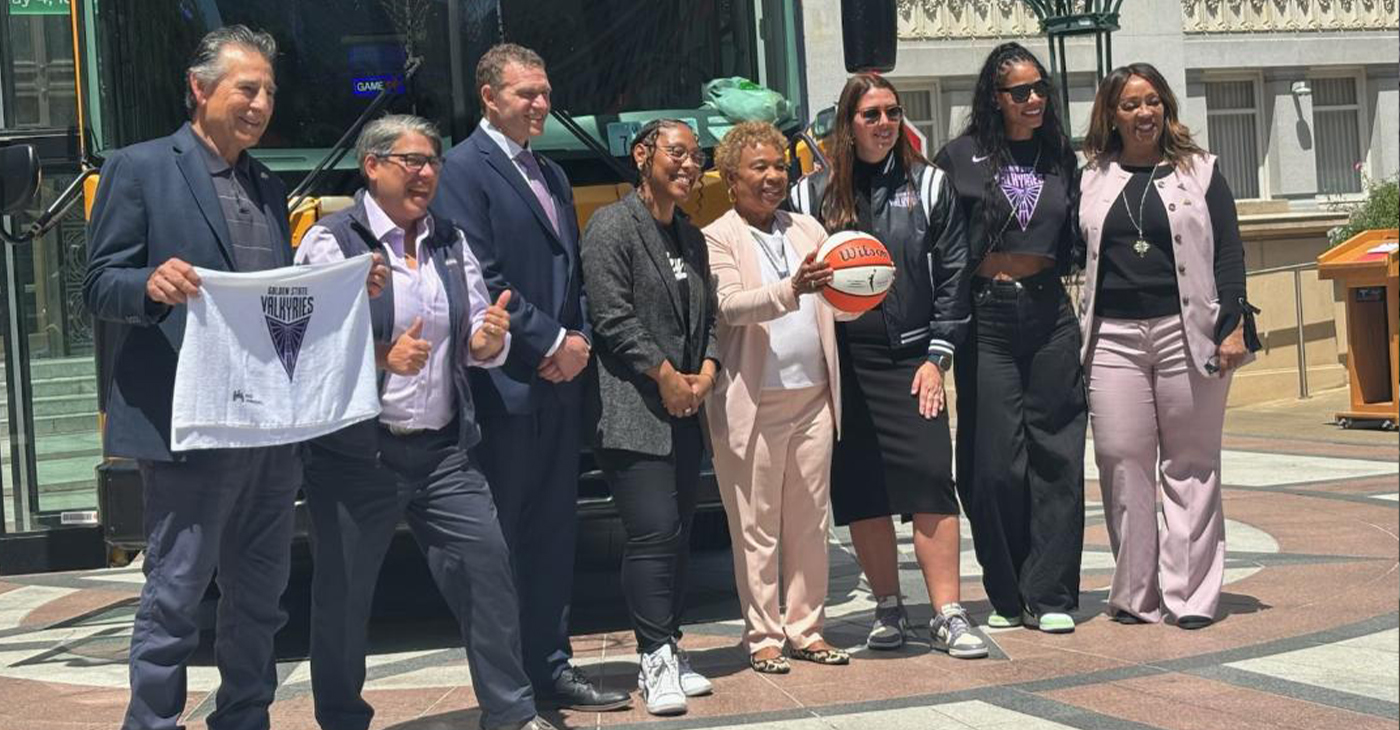
Team installs new nets at playgrounds, holds flag-raisings at City Halls in Oakland and S.F.
Special to The Post
The Golden State Valkyries brought the excitement of their inaugural season to every corner of the Bay Area with a full slate of community celebrations leading up to their historic home-opener against the Los Angeles Sparks at the Chase Center in San Francisco on Friday.
The week featured flag-raising ceremonies at city halls in Oakland and San Francisco, three “Violet Net” installation days at Oakland parks to encourage basketball play, fun “Hoopbus” takeovers at multiple schools presented by Kaiser Permanente, and player appearances.
“The Golden State Valkyries are more than a team—they’re a movement,” said Oakland Interim-Mayor Kevin Jenkins. “Their touchdown in Oakland marks a new era of opportunity, inspiration, and equity in sports. This partnership reflects our city’s deep commitment to uplifting women, investing in youth, and building a community where every dream has a place to grow. We’re proud to welcome the Valkyries to The Town.”
In total, 90 violet nets were installed on 45 basketball courts across 34 public parks throughout Oakland this week. A list of the parks receiving violet nets can be found at Valkyries.com.
About the Golden State Valkyries
The Golden State Valkyries, the WNBA affiliate of the seven-time NBA Champion Golden State Warriors, were announced as the 13th WNBA franchise on Oct. 5, 2023. According to Norse mythology, Valkyries are a host of warrior women who are fearless and unwavering – flying through air and sea alike.
This brand is Golden State’s modern interpretation of Valkyries: strong, bold, and fierce. Tipping off during the 2025 WNBA season, the team is headquartered in Oakland and will play home games at Chase Center in San Francisco. For Golden State Valkyries’ assets, including team logos, visit valkyries.com.
Activism
McClymonds High Names School Gym for Star Graduate, Basketball Legend Bill Russell
William “Bill” Felton Russell was born on Feb. 12, 1934, and died on July 31, 2022. He achieved fame as a U.S. professional basketball player who played center for the Boston Celtics of the National Basketball Association (NBA) from 1956 to 1969. He was the centerpiece of the Celtics dynasty that won 11 NBA championships during his 13-year career.
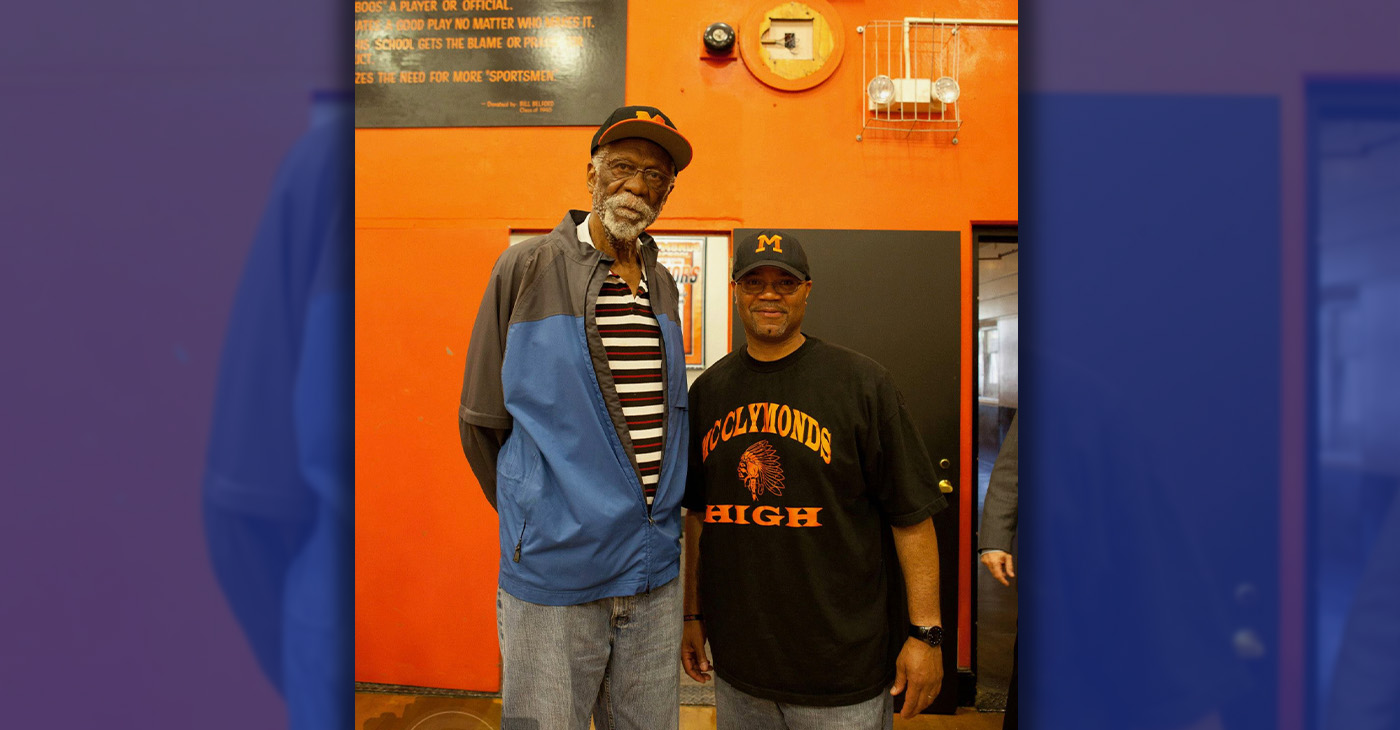
By Ken Epstein
West Oakland’s McClymonds High School, “the School of Champions,” this week named the school’s gymnasium in honor of one of its most famous graduates, basketball legend Bill Russell (class of ’52).
William “Bill” Felton Russell was born on Feb. 12, 1934, and died on July 31, 2022. He achieved fame as a U.S. professional basketball player who played center for the Boston Celtics of the National Basketball Association (NBA) from 1956 to 1969. He was the centerpiece of the Celtics dynasty that won 11 NBA championships during his 13-year career.
Russell is widely known as one of the greatest basketball players of all time. In 2011, he received the Presidential Medal of Freedom, the country’s highest civil honor, from President Barack Obama for Russell’s contributions to basketball and the Civil Rights Movement.
The McClymonds’ naming ceremony was held on Wednesday, the same day as Russell’s birthday. Oakland leader Bill Patterson, a longtime friend of Russell’s, was scheduled to cut the ribbon at the reopening of the gym, which had been closed for several months for renovation. Russell’s daughter Karen was scheduled to attend the ribbon cutting.
Russell’s name and signature are now printed on the gymnasium floor.
Patterson was working at DeFremery Park when he met Russell. “I befriended him as a boy and during his years at University of San Francisco” said Patterson. “We stayed friends for the rest of his life.”
Said McClymonds Principal Darielle Davis, herself a McClymonds graduate, “We are excited to honor Bill Russell for his sports accolades and because he broke color barriers. He is part of our legacy, and legacy is really important at McClymonds.”
Brian McGhee, community schools manager at McClymonds and former football player at UC Berkeley, said that Russell meant a lot to him and others at the school. “He was a beacon of light and hope for West Oakland,” he said. “He did a lot for sports and for civil rights.”
Starting in 2018, Ben “Coach” Tapscott worked with Patterson and other McClymonds grads, community members, and former coaches to encourage the Oakland Board of Education to endorse the naming of the school gym, which finally happened recently.
“We worked hard to make this happen,” said Tapscott. “He’s an important part of McClymond’s history, along with a lot of other famous graduates,” he said.
-

 Activism3 weeks ago
Activism3 weeks agoOakland Post: Week of November 12 – 18, 2025
-

 Activism4 weeks ago
Activism4 weeks agoOakland Post: Week of November 5 – 11, 2025
-

 Activism2 weeks ago
Activism2 weeks agoIN MEMORIAM: William ‘Bill’ Patterson, 94
-

 Activism3 weeks ago
Activism3 weeks agoHow Charles R. Drew University Navigated More Than $20 Million in Fed Cuts – Still Prioritizing Students and Community Health
-

 Bay Area3 weeks ago
Bay Area3 weeks agoNo Justice in the Justice System
-

 #NNPA BlackPress3 weeks ago
#NNPA BlackPress3 weeks agoThe Perfumed Hand of Hypocrisy: Trump Hosted Former Terror Suspect While America Condemns a Muslim Mayor
-

 #NNPA BlackPress2 weeks ago
#NNPA BlackPress2 weeks agoTrump’s Death Threat Rhetoric Sends Nation into Crisis
-

 #NNPA BlackPress4 weeks ago
#NNPA BlackPress4 weeks agoProtecting Pedophiles: The GOP’s Warped Crusade Against Its Own Lies

